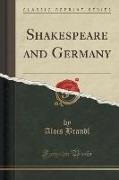Share
Sold out
Alois Brandl
Shakespeare and Germany (Classic Reprint)
English · Paperback / Softback
Description
Excerpt from Shakespeare and Germany
The Spectator did become popular, Robinson and Gulliver were read even in our villages; but what they had to offer was only poetry of the foot - to use a happy expression of Professor Herford - not poetry of the wing; they proved suggestive and amusing, but did not contain any revelations. The tide did not turn until, a short time before the French Revolution, Shakespeare conquered Germany with his word and his thought: then England, for the first time, had a voice on the Rhine and by the Danube, and became a force in the growth of German culture.
The man who was chiefly instrumental in bringing about this change was Lessing. Many educated Germans felt about Shakespeare as he felt, and some of our literary men were working in the same direction in which he worked; but Lessing produced the strongest argument. He started from the opinion of Voltaire, whose critique and imitations of Shakespeare had done most towards calling the attention of German readers to the English dramatist. The great Voltaire had learned in England that Shakespeare had a large soul, and was a genius by nature; but he found him a sinner against the rules of Aristotle as deduced by the classicists. No, said Lessing; Shakespeare does not sin against the rules of Aristotle, if you but understand them properly; Shakespeare agrees with him in all essential things much better than Voltaire himself. As an example, Lessing compared the appearance of the ghost in Voltaire's Semiramis, in broad daylight, at the council-assembly, announced only by a clap of thunder, with the ghost in Hamlet, which appears at midnight, on the ramparts of Elsinore, seen first by the lonely sentries, through whose observations we are well prepared for what it has to tell Hamlet. A clearer and more convincing comparison could not be given, and Shakespeare at once took his place on the throne vacated by Voltaire. Evidently, Lessing pitted one of the two literary authorities recognized in his country at the time against the other, the ancients against the French - more perhaps than was strictly legitimate. He thus succeeded in calling in a third authority, the English; and by multiplying our authorities he gave us greater confidence to think independently.
This discussion might have remained a transitory literary controversy: but circumstances raised it to the position of a starting-point for great deeds.
Germany wanted dramas.
About the Publisher
Forgotten Books publishes hundreds of thousands of rare and classic books. Find more at www.forgottenbooks.com
This book is a reproduction of an important historical work. Forgotten Books uses state-of-the-art technology to digitally reconstruct the work, preserving the original format whilst repairing imperfections present in the aged copy. In rare cases, an imperfection in the original, such as a blemish or missing page, may be replicated in our edition. We do, however, repair the vast majority of imperfections successfully; any imperfections that remain are intentionally left to preserve the state of such historical works.
Product details
| Authors | Alois Brandl |
| Publisher | Lulu Pr |
| Languages | English |
| Product format | Paperback / Softback |
| Released | 31.07.2015 |
| No. of pages | 20 |
| Dimensions | 152 mm x 229 mm x 1 mm |
| Weight | 41 g |
| Subject |
Fiction
> Poetry, drama
|
Customer reviews
No reviews have been written for this item yet. Write the first review and be helpful to other users when they decide on a purchase.
Write a review
Thumbs up or thumbs down? Write your own review.

